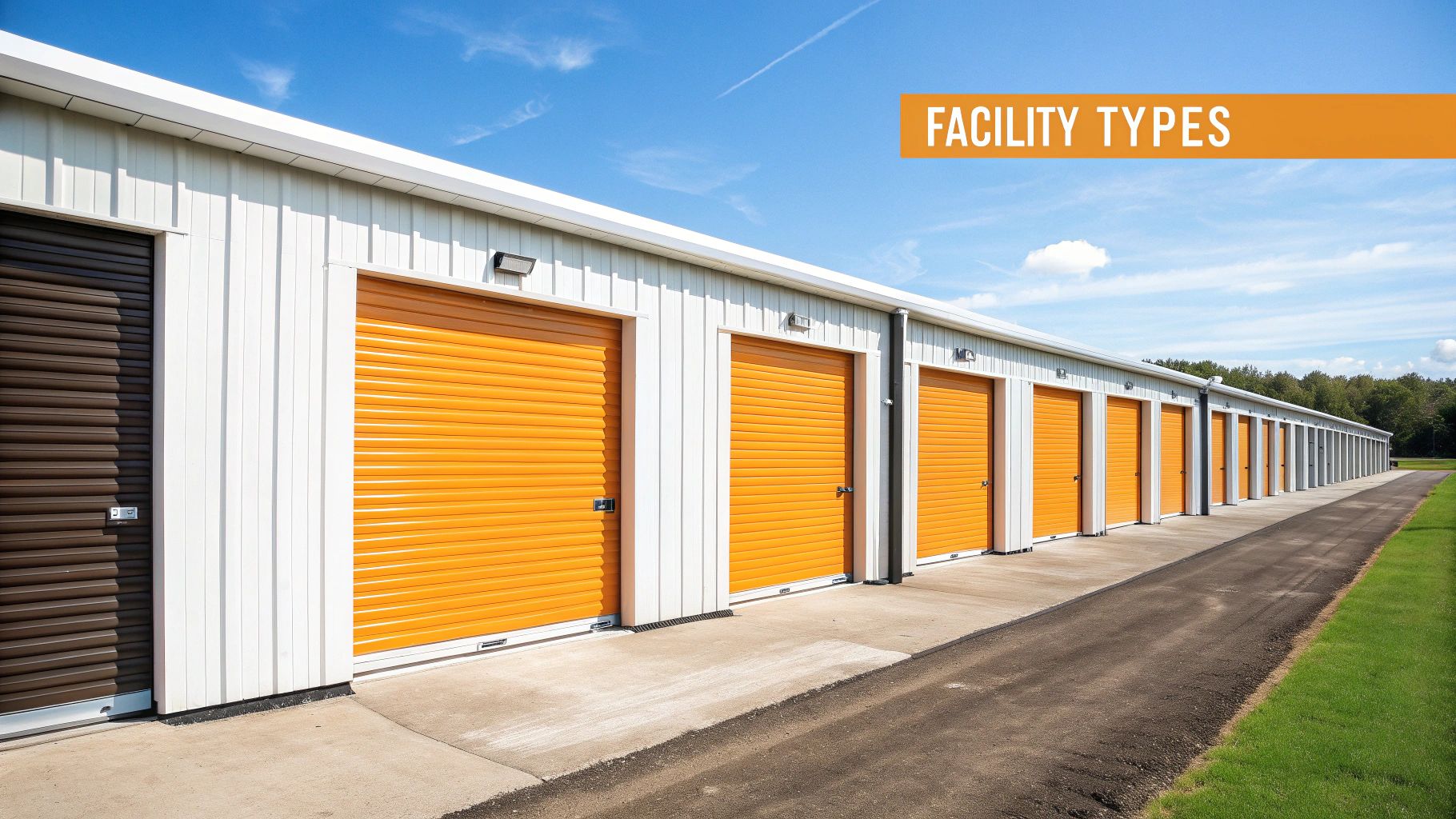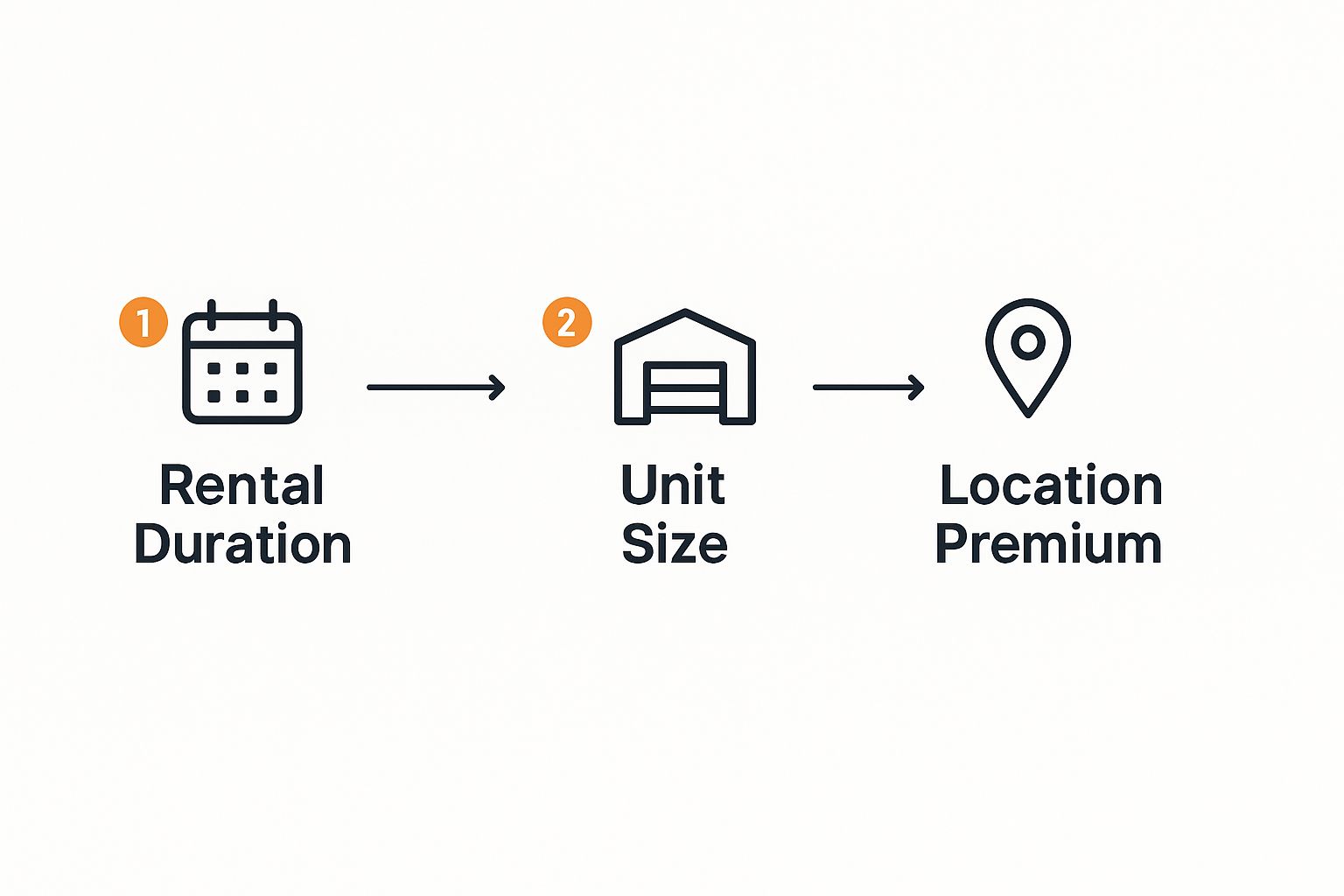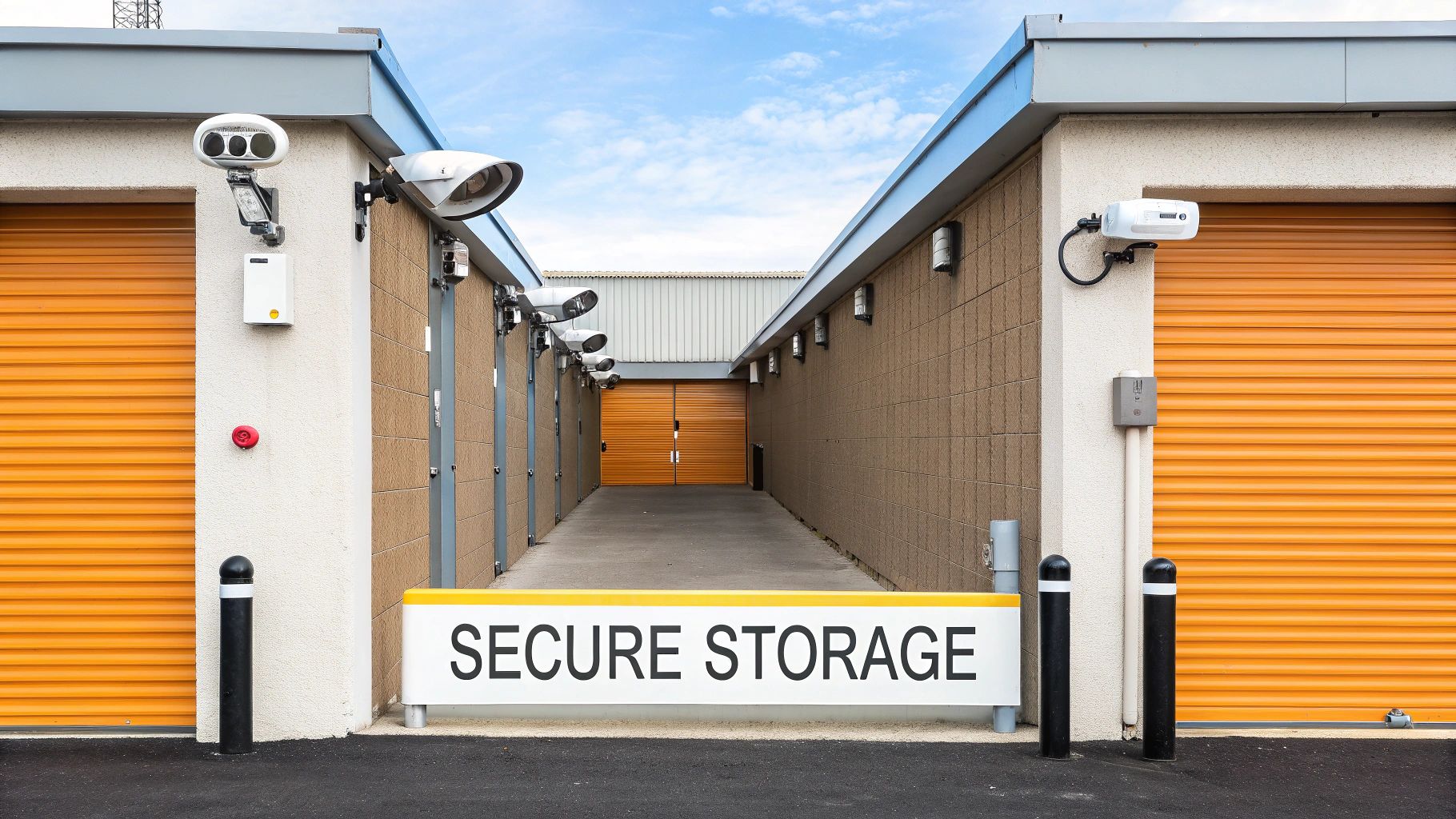That search for "business storage near me" isn't just about finding a space—it's a smart, strategic move for any agile UK business. It signals a shift away from locking yourself into expensive, rigid commercial leases and embracing flexible, on-demand space that actually works for you.
Why Smart UK Businesses Now Rely on Local Storage
The way we do business has fundamentally changed. Gone are the days of needing a massive office or warehouse tied to a long-term, restrictive lease. Today, the real prize is operational freedom, and local storage units are one of the best tools to get you there.
Think about an e-commerce brand. A local unit can act as a nimble mini-fulfilment centre, letting them scale up stock for seasonal rushes without the commitment of permanent warehouse space. Or a skilled tradesperson who can finally clear out their van and home garage, securely stashing valuable tools and materials closer to where they actually work. It’s not just decluttering; it’s professionalising the entire operation.
The New Business Necessity
The rise of remote and hybrid working has only sped this up. Plenty of companies are downsizing their main offices, but they still need a secure, accessible place for things like:
- Document Archiving: Keeping important financial records and sensitive client files safe.
- Equipment and Assets: Storing surplus office furniture, IT hardware, or bulky event materials.
- Excess Stock: Managing inventory overflow so it doesn't clutter up a smaller, primary workspace.
Local self-storage provides that crucial buffer. It's a cost-effective alternative to traditional commercial property that allows your business model to stay lean and pivot quickly.
You can see this shift in the market's explosive growth. The UK self-storage industry is currently valued at around £1.08 billion and is projected to nearly double by 2033. This boom is largely driven by businesses just like yours seeking this exact kind of flexibility. You can find more data on this expansion over at OpenPR.com.
If you want to dig deeper into the specific advantages, check out our guide on the 7 key benefits of self-storage. This isn’t just a passing trend; it’s a fundamental change in how UK businesses are getting things done.
Pinpointing Your Actual Storage Needs

Before you even type “business storage near me” into a search bar, the most crucial work begins right in your own workspace. It's easy to make a rough guess about how much space you need, but taking the time to get specific will save you both money and headaches down the road.
Start by doing a proper inventory of everything you plan to store. This is more than just a quick headcount. You'll want to document the dimensions and weight of your larger items and group smaller things into clear categories. A detailed inventory helps you accurately estimate the total volume you require, which is key to avoiding two common pitfalls: overpaying for a unit that’s half-empty or scrambling for more space when you run out of room.
If you’re not sure how to translate your list of items into a specific unit size, our guide can help you figure out how much storage space you need.
Define Your Non-Negotiables
Once you have a solid idea of the size you need, it's time to nail down the features that are absolutely essential for your business. Every company's needs are different, so think about what a deal-breaker would be for you.
Let's look at a few real-world examples:
- A law firm archiving client files: For them, security is everything. They'd need a unit with individually alarmed doors, comprehensive CCTV, and tightly controlled site access.
- An e-commerce clothing retailer: Delicate fabrics are susceptible to damp and temperature swings. Climate-controlled storage is a must-have to prevent mould and protect their inventory.
- A marketing agency with event stands: They need pure convenience. A ground-floor, drive-up unit is non-negotiable for easily loading and unloading bulky display materials without a fuss.
To help you get clear on your own needs, we’ve put together a checklist. Running through these questions before you start your search will help you create a shortlist of facilities that are actually a good fit.
Business Storage Needs Assessment Checklist
| Requirement Category | Key Questions to Ask | Example Business Scenario |
|---|---|---|
| Space & Size | What is the total volume of items? Do I need room to grow? Will I need shelving or racking? | An online seller estimates needing 50 sq ft now but anticipates doubling their stock in six months, so they look for a facility with easy unit transfers. |
| Access Needs | Will I need access outside of standard 9-5 hours? Do multiple team members require entry? | A catering company often needs to pick up equipment at 5 a.m. for early events, making 24/7 access a critical requirement. |
| Item Sensitivity | Are my items sensitive to temperature or humidity (e.g., electronics, documents, textiles)? | A photographer storing archival prints and expensive camera gear requires a climate-controlled unit to prevent damage from dampness. |
| Security Level | What is the value of the items being stored? Do I need individual unit alarms or just perimeter security? | A pharmaceutical rep storing valuable samples needs top-tier security, including gated access, individual alarms, and extensive CCTV coverage. |
| Logistics | How often will I be loading/unloading? Are the items heavy or bulky? Will I be receiving deliveries directly to the unit? | A tradesperson with heavy tools and materials needs a drive-up ground floor unit to avoid carrying equipment up lifts or down long corridors. |
By thinking through these points, your list of non-negotiables acts as a powerful filter, immediately ruling out facilities that can’t meet your core operational requirements. This makes your search far more targeted and efficient.
A Smarter Way to Find and Compare Local Storage
Finding the right facility takes more than just a quick search for "business storage near me." The best options often come from candid recommendations, not just paid ads at the top of a results page.
A great starting point is to tap into your local business network. Ask for genuine suggestions in community forums or your trade groups. A fellow tradesperson or e-commerce owner can give you the real story on a facility’s reliability, security, and staff helpfulness—details you just won't find on a glossy website. These firsthand accounts are invaluable for building an initial shortlist.
Compare What Actually Matters
Once you have a few names, it's time to compare them properly. It's easy to get swayed by flashy introductory offers, but you need to focus on the metrics that will affect your operations and your budget in the long run.
As you can see, the total cost comes down to a blend of your rental duration, the unit size, and any premiums based on location. I'd recommend creating a simple spreadsheet to track and compare these key details for each facility on your list.
The goal here is to make an informed, data-backed decision. You should be comparing the true monthly cost after any deals expire, the specifics of their security (like monitored alarms vs. basic cameras), and the flexibility of their contract terms.
Digging into these details is crucial for finding a space that truly supports your business. A simple way to see what's available is to use a detailed search tool; our own location finder can help you compare options across several areas.
Consider these practical points when you're comparing facilities:
- Gate Access Hours: Do they actually align with your work schedule? If you need to do early morning stock runs or late-night drop-offs, you'll want 24/7 access.
- On-Site Staff: Is there a manager present during business hours? This can be vital for accepting deliveries on your behalf or handling any immediate issues that crop up.
- Contract Flexibility: What's the notice period to vacate? Try to avoid getting locked into long-term commitments that don't match your business's agility.
By systematically comparing these factors, you move beyond just choosing the facility with the biggest sign and instead select a genuine business partner.
What to Look for During an On-Site Visit
A slick website is one thing, but an in-person visit tells you the real story. This is your chance to see past the marketing photos and verify that the features advertised online match the reality on the ground. It's the only way to be sure you’re choosing a secure and well-managed space for your business.
First impressions count for a lot. As you arrive, take a look around. Check for general cleanliness and upkeep across the property, from the entrance gate right down to the corridors. Litter, poorly maintained lighting, or obvious signs of disrepair are major red flags that suggest management isn't on top of things.
Checking Security and Conditions
When you get to inspect a demo unit, it's time to pay close attention to the details. Look for any signs of damp, strange odours, or evidence of pests. This is also the perfect moment to scrutinise the security features firsthand.
- CCTV Coverage: Don’t just take their word for it. Ask to see the monitor and check if the cameras actually cover the specific corridor and entrance to your potential unit.
- Access Control: Give the gate keypad a test. Does it feel robust? Is the perimeter fencing secure, without any obvious weak spots or gaps?
- Lighting Quality: You'll likely visit during the day, but try to imagine you need to access your unit after dark. Are the hallways and outdoor areas well-lit enough for you to feel safe?
Talking to the on-site manager is one of the most valuable things you can do. Gauge their professionalism and ask pointed questions about how they handle security alerts or maintenance requests. Their response tells you everything about the level of service you can expect.
The UK's storage industry is booming, with over 2,200 facilities now available, so you have plenty of options. This growth means you don't have to settle for a provider that doesn't meet your standards. You can discover more insights about the UK’s self-storage industry growth and find a facility that ticks every single box.
Digging into Contracts and Spotting Hidden Costs
The price you see advertised is almost never the final figure you'll pay when looking for business storage. Those attractive introductory offers are designed to pull you in, but the real cost is buried in the rental agreement. Be warned: many facilities tack on extra fees that can quickly inflate your monthly bill.
It's common to find a few extra charges cropping up. Expect potential one-off administration fees for setting up your account, extra costs for a specific high-security lock, or even a requirement to buy the facility’s own insurance policy. While convenient, this in-house insurance can often be pricier than arranging your own cover.
Reading Between the Lines of Your Agreement
Before you sign on the dotted line, you need to get forensic with the contract. The clauses in that agreement dictate your rights and financial obligations for as long as you rent the space. Pay very close attention to anything related to rent increases; a low starting rate is no good if it doubles after three months.
For a growing business, flexibility is everything. A facility that only requires a short notice period to vacate gives you the agility to adapt if your space needs suddenly change.
You’ll also want to clarify any restrictions. Some facilities might prohibit storing certain materials, and you need to be absolutely sure your inventory or equipment is compliant. Asking these questions upfront will save you from major headaches down the line. Getting a handle on the key factors that influence self-storage prices will give you a much clearer idea of what to expect.
Recent trends show that while home moves still drive a lot of demand, a hefty 33% of storage users are businesses needing space for stock, often due to remote working or downsizing. This has tightened supply and pushed prices up across the board. You can read the full analysis of the self-storage market boom to get a better sense of these market dynamics. Being informed on these points ensures there are no nasty financial surprises after you've moved all your valuable assets in.
Making Your Final Decision
Right, you’ve done the legwork. You’ve visited the sites, asked the tough questions, and probably have a few strong contenders on your shortlist. Now it’s time to land on a final choice, which is about balancing the key factors that will actually affect your day-to-day operations. This isn't just about finding the cheapest "business storage near me"; it's about finding a reliable partner for your business.
It’s a classic trade-off: cost versus convenience, security versus flexibility. For an e-commerce seller, having 24/7 access and knowing the facility can accept deliveries on your behalf might be well worth a slightly higher monthly fee. But if you’re a law firm archiving sensitive documents, top-tier security with individual unit alarms is a deal-breaker, even if the location is five minutes further down the road.
Document and Organise from Day One
Before you even think about moving a single box in, take five minutes to document the unit's condition. A few clear photos or a quick video of the interior, paying close attention to the floors, walls, and the door mechanism, is all it takes. This simple step creates a baseline record that protects you from any potential disputes about damages when it’s time to move out.
Once the contract is signed and the keys are in your hand, plan your unit's layout for pure efficiency.
- Front-load your high-frequency items. If you're constantly grabbing certain stock or tools, make sure they’re right by the door. No digging required.
- Leave a central aisle. Trust me on this. It stops you from having to play Tetris and empty half the unit just to get to that one box at the very back.
- Use sturdy, clear containers. Labelling is a great start, but being able to see what’s inside at a glance is a massive time-saver.
Here's a final tip that people often overlook: build a good relationship with the on-site manager. A friendly chat and a bit of rapport can make a world of difference if you ever need a little flexibility or help with an unexpected issue. It’s that human element that really solidifies a smart, confident decision.
Got Questions About Business Storage? We've Got Answers
Even after you've mapped out a plan, a few questions are bound to pop up. It's totally normal. When you're searching for the right business storage unit, I've found that some queries come up again and again. Getting clear answers to these is the key to making a final decision you feel great about.
Security is almost always the first topic on everyone's mind. What features should be non-negotiable when you're storing valuable business assets? Honestly, a simple padlock and a fence just don't cut it anymore. For genuine peace of mind, you should insist on 24/7 monitored CCTV, secure electronic gate access that keeps a log of everyone coming and going, and ideally, staff on-site during business hours. The really top-notch facilities will even offer individually alarmed units.
Insurance, Deliveries, and Other Key Details
Another area that often causes a bit of confusion is insurance. Do you really need a separate policy for your stored goods? The short answer is a definite yes. It's a common mistake to assume your existing business insurance covers off-site inventory, so it's vital to check your policy's small print. While the storage provider will have their own insurance options, it's often worth getting a quick quote from a third-party insurer—you might find better coverage at a more competitive rate.
Never assume the facility's basic liability protection covers the full replacement value of your commercial goods. Always secure dedicated cover for your specific inventory or equipment.
Finally, there's one question that, in my experience, separates a good facility from a great one for businesses: can you have stock and deliveries sent straight to your unit? For an e-commerce brand or a busy tradesperson, this is an absolute game-changer. Many modern, business-focused sites are geared up to accept packages on your behalf, keeping them safe and sound until you can swing by.
Not all facilities offer this, though. Make this one of your first questions, because it can seriously streamline your operations. It saves you time and means you don't have to worry about valuable deliveries being left unattended at your workshop or on your doorstep. This one feature can make a massive difference to how smoothly your business runs day-to-day.
Ready to find a storage solution that ticks all the boxes? At Standby Self Storage, we provide secure, flexible, and convenient units perfect for any business need. Find your ideal unit and book online today.



